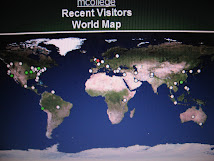ESL 2006-2007
* Expanding Listening Comprehension Skills
* Raising Self-Awareness of Contemporary Social Issues
* Gaining Access to the World's Coolest Music Programs
All can be done by Frequently Accessing University Radio, to Experience:
(1) Diverse Content (i.e. Oral English Content that Changes on a Daily Basis and From Region to Region)
(2) Content that is Appropriate to Reinforce upper Intermediate and Advanced levels of English Language Proficiency
(3) Content that is Often Archived so that You May Access It at Your Convenience and as Often as You Want for Practice Purposes
and Finally,
(4) Content that is Free.
What More Could A Student Want !
___________
LISTENING RESOURCES YOU CAN RELATE TO...
Unlike so-called "University Radio Stations" in certain countries, which are completely controlled by university authorities, and which only permit students to broadcast to fellow students on a campus through a P.A.system (i.e. loudspeakers located outdoors and in dormitories), University Radio Stations in more open countries are engineered, produced and operated solely by university students working voluntarily on a part-time basis.
Like many commercial radio stations, these university student-based stations tend to broadcast on the FM band, and they are governed by the same national broadcasting regulations that govern commercial radio. In other words, these university radio stations broadcast to the general public, to homes, cars and businesses, and they broadcast on the Internet as well.
This genuine kind of University Radio has been around for more than 50 years, and on the Internet for the past six years.
These stations are operated by tertiary level students who are generally between the ages of 18 and 24.
The programming created by the students is diverse, intelligent and contemporary. Many programs are archived so that you can listen to them at your convenience, any time.
Some of these stations operate 24 hours a day.
At some stations the voluntary part-time work-force of students numbers more than 200.
The costs of running these stations is financed by listeners, in the local communities where these stations broadcast, making donations. In other words these stations are listener-financed.
The bottom line here is that you can access these sources of good oral English at any time.You can listen to these stations on your computer at home. You can listen to these stations play in the background on your computer while you work on other things.
These stations have a programming schedule which you can consult to select the programs you want to hear. Some programs involve interviews dealing with social issues, while others involve sports, technology, science, relationships, music of different genres, current affairs and other subjects.
The programs are hosted equally by male and female students.
Many university radio stations archive past interviews, thus providing a great reservoir of listening exercises for you. Many of the interviews are with musicians. Other interviews involve social issues. Hey, guess what...it's all free for you to use to strengthen your English listening skills. You can replay the interviews over and over until you understand them. You can even communicate with some of the students who host these programs. Work smart, have fun... It's up to you whether you use these resources. You control your body...you control the development of your mind...would you want it any other way? So do it... !
The following links represent a sample of these stations.
The sample links below, and other similar links you can find through a Google Advanced Search, offer you access to listening content that is generally of A-Level quality, live, relevant to your stage of life, of diverse and ever-changing content, commercial-free and cost-free.
Of course, only you can decide whether to use this resource on a regular, continuing basis.
Try listening to the station of your choice at least 30 + minutes a day. The formats include monologue, duologue, group and talk radio. Try different stations from different regions to familiarize yourself with different English Accents and diverse audio content. Control is yours, through your own computer. Work smart, have fun...
University Radio Links:
Britain Sample:
Britain York University Radio www.ury.york.ac.uk
Britain Cambridge University Radio www.cur1350.co.uk
Britain Nottingham University Radio www.urn1350.net
U.S.A.
University of Hawaii at Hilo www.radio.uhh.hawaii.edu
Canada University Radio all operated by students 19 to 24 years old...
Ontario Universities
CHRW University of Western Ontario
CKMS 100.3 FM University of Waterloo
CKCU Carleton University; Ottawa, ON
CHUO FM 89.1 (University of Ottawa)
CFRC Queen's University; Kingston, ON
CFFF Trent University; Peterborough, ON
CIUT University of Toronto; Toronto, ON
CHMR Mohawk College; Hamilton, ON
CFRU University of Guelph; Guelph, ON
CJAM University of Windsor; Windsor, ON
CFMU Hamilton, Ontario
British Columbia Universities
CJSF Burnaby, BC, Community-based campus radio. Programming is streamed on web site.
CITR University of British Columbia, Vancouver, BC
CFUV University of Victoria; Victoria, BC
Kootenay Coop Radio (KCR 93.5 FM) On this station you'll hear just about everything from bluegrass to freaky audio art with some social commentary in between. It's ecclectic, too eccletic in fact for the likes of Britney Spears and Ricky Martin. It is the true voice of the Canadian Kootenays.
Alberta Universities
CJSW University of Calgary, Calgary, AB
CKUA Radio Network Innovative web site featuring alternative radio sources. Plays everything from jazz to country and blues to bluegrass. Listeners donate voluntarily more than $2-million a year to keep it alive.
CKUL University of Lethbridge; Lethbridge AB
CJSR FM88 CJSR FM88 is Edmonton's volunteer-run college/community radio station, broadcasting 24-hrs a day
Saskatchewan University
CFCR Saskatoon, SK
Manitoba University
UMFM Hit Free Radio Winnipeg Campus Radio
Eastern Canada Universities
CFMH University of New Brunswick,Campus Radio Saint John 92.5 FM
CHMR Memorial University of Newfoundland (St John's)
CFXU Saint Francis Xavier University; Antigonish, NS
CHSR University of New Brunswick; Fredericton, NB
CHMA Mount Allison University; Sackville, NB
U.S.A. University Radio Stations
Columbia University Radio in New York www.columbia.edu/cu/wkcr
U.S.A. Top ninety-three University Radio Stations in popularity
SITE LISTINGS By Popularity
Sites 1 - 20 (of 93) (see 2 3 4 5 below for the remaining 73 of the links)
WCSB 89.3 - Cleveland State University www.wcsb.org
KALX 90.7 - University of California, Berkeley Broadcasting in a free form fashion from UCB, supported by listeners and run by volunteers.www.kalx.berkeley.edu
WERS 88.9 - Emerson College Offers noncommercial programming with a broad musical mix.www.wers.org
WPRB 103.3 - Princeton University www.wprb.com
Zilo.com Features original entertainment for college students including sketch comedy, reality TV, live event sports, and more.www.zilo.com
KFJC 89.7 - Foothill College@dir.yahoo.com/.../College_and_University/Community_and_Technical
WHRB 95.3 - Harvard University www.whrb.org
KSJS 90.5 - San Jose State University Programming includes a wide range of eclectic info and music.www.ksjs.org
KBSU 90.3 - Boise State University Public radio serving southwestern Idaho, eastern Oregon, and northern Nevada.www.radio.boisestate.edu
WEMU 89.1 - Eastern Michigan University Featuring news, blues, and jazz.www.wemu.org
KZSU 90.1 - Stanford University@dir.yahoo.com/.../News_and_Media/Radio
KVRX 91.7 - University of Texas at Austin@dir.yahoo.com/.../University_of_Texas_at_Austin/News_and_Media
WCBN 88.3 - University of Michigan@dir.yahoo.com/.../University_of_Michigan/News_and_Media
KAMP 1570 - University of Arizona Broadcasting college radio news, sports, and music.www.kamp.arizona.edu
WGTS 91.9 - Columbia Union College www.wgts.org
WRTC 89.3 - Trinity College Trinity College radio.www.wrtcfm.com
WMUA 91.1 - University of Massachusetts Amherst www.wmua.org
KWMU 90.7 - University of Missuori - St. Louis St. Louis public radio. NPR station offering news and talk.www.kwmu.org
KUOI 89.3 - University of Idaho Free-form radio station owned and operated by the Associated Students of the University of Idaho (ASUI).http://kuoi.asui.uidaho.edu
KPSU 1450 - Portland State University@dir.yahoo.com
1 Links for the Next 73 stations: 2 3 4 5 Next
Other Worldwide College and University Internet Radio Broadcasting Stations (Some include Podcasts in their repertory)
For a listing of another 800 + university radio stations in 12 countries (including about 700 more in the U.S.A.) click the following link.
http://dir.yahoo.com/News_and_Media/Radio/Stations/College_and_University/By_Region/Countries/
The Choice is Huge...the choice is yours...
Work hard, work smart, have fun with good listening...
_________________________________________




